Perseverative responding in a violation-of-expectation task in 6.5-month-old infants
- PMID: 12804814
- PMCID: PMC4212222
- DOI: 10.1016/s0010-0277(03)00044-1
Perseverative responding in a violation-of-expectation task in 6.5-month-old infants
Abstract
In the present research, 6.5-month-old infants perseverated in a violation-of-expectation task designed to examine their reasoning about width information in containment events. After watching a familiarization event in which a ball was lowered into a wide container, the infants failed to detect the violation in a test event in which the same ball was lowered into a container only half as wide as the ball (narrow-container test event). This negative result (which was replicated in another experiment) was interpreted in terms of a recent problem-solving account of infants' perseverative errors in various means-end tasks (Aguiar, A., & Baillargeon, R. (2000). Perseveration and problem solving in infancy. In H. W. Reese (Ed.), Advances in child development and behavior (Vol. 27, pp. 135-180). San Diego, CA: Academic Press). It was assumed that the infants in the present experiments (1) did not attend to the relative widths of the ball and container in their initial analysis of the narrow-container test event, (2) categorized the event as similar to the familiarization event shown on the preceding trials, and (3) retrieved the expectation they had formed for that event ("the ball will fit into the container"), resulting in a perseverative error. This interpretation was supported by additional experiments in which different modifications were introduced that led to non-perseverative responding, indicating that 6.5-month-old infants could detect the violation in the narrow-container test event. The present findings are important for several reasons. First, they provide the first demonstration of perseverative responding in a violation-of-expectation task. Second, they make clear the breadth and usefulness of the problem-solving account mentioned above. Finally, they add to the evidence for some degree of continuity between infants' and adults' problem-solving abilities.
Figures

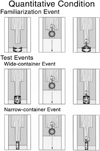
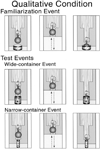
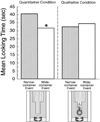
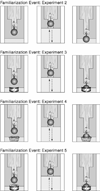

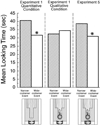
References
-
- Aguiar A, Baillargeon R. 8.5-month-old infants’ reasoning about containment events. Child Development. 1998;69:636–653. - PubMed
-
- Aguiar A, Baillargeon R. 2.5-month-old infants’ reasoning about when objects should and should not be occluded. Cognitive Psychology. 1999;39:116–157. - PubMed
-
- Aguiar A, Baillargeon R. Perseveration and problem solving in infancy. In: Reese HW, editor. Advances in child development and behavior. Vol. 27. San Diego, CA: Academic Press; 2000. pp. 135–180. - PubMed
-
- Aguiar A, Menard KR. Perseverative errors in means-end support tasks: further findings; Paper presented at the Biennial Meeting of the Society for Research in Child Development; Minneapolis, MN. 2001. Apr,
Publication types
MeSH terms
Grants and funding
LinkOut - more resources
Full Text Sources
Medical
Miscellaneous

